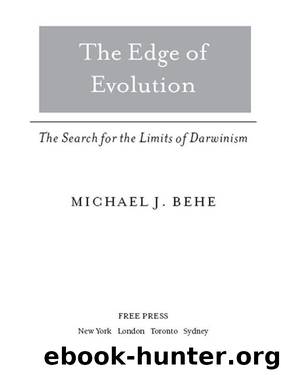The Edge of Evolution: The Search for the Limits of Darwinism by Behe Michael J

Author:Behe, Michael J. [Behe, Michael J.]
Language: eng
Format: epub
Publisher: Free Press
Published: 2007-06-05T03:00:00+00:00
DARWIN MEETS MICHELSON-MORLEY
P. falciparum, HIV, and E. coli are all very, very different from each other. They range from the simple to the complex, have very different life cycles, and represent three different fundamental domains of life: eukaryote, virus, and prokaryote. Yet they all tell the same tale of Darwinian evolution. Single simple changes to old cellular machinery that can help in dire circumstances are easy to come by. This is where Darwin rules, in the land of antibiotic resistance and single tiny steps. Burning a bridge that can stop an invading army or breaking a lock that can slow a burglar are easy and effective. But if just one or a few steps have to be jumped to gain a beneficial effect, as with chloroquine resistance, random mutation starts breathing hard. Skipping a few more steps appears to be beyond the edge of evolution.
There is much evidence from these studies that, in their incoherent flailing for short-term advantage, Darwinian processes can easily break molecular machinery. There is no evidence that Darwinian processes can take the multiple, coherent steps needed to build new molecular machinery, the kind of machinery that fills the cell.
Yet if it can do so little, why is random mutation / natural selection so highly regarded by biologists? Because the dominant theory requires it. There is ample precedent in the history of science for the overwhelming bulk of the scientific community strongly believing in imaginary entities postulated by a favored theory. For example, in the nineteenth century physicists knew that light behaved as a wave, but a wave in what? Ocean waves travel through water, sound waves through air; what medium do light waves travel through as they traverse space from the sun to the earth? The answer, announced with the utmost confidence by James Clerk Maxwell, the greatest physicist of the age, was the âaetherâ (that is, âetherâ).17
Download
This site does not store any files on its server. We only index and link to content provided by other sites. Please contact the content providers to delete copyright contents if any and email us, we'll remove relevant links or contents immediately.
| Africa | Americas |
| Arctic & Antarctica | Asia |
| Australia & Oceania | Europe |
| Middle East | Russia |
| United States | World |
| Ancient Civilizations | Military |
| Historical Study & Educational Resources |
The Bomber Mafia by Malcolm Gladwell(1184)
Submerged Prehistory by Benjamin Jonathan; & Clive Bonsall & Catriona Pickard & Anders Fischer(1162)
Facing the Mountain by Daniel James Brown(1136)
The Dawn of Everything by David Graeber & David Wengrow(1112)
The Way of Fire and Ice: The Living Tradition of Norse Paganism by Ryan Smith(1033)
Wandering in Strange Lands by Morgan Jerkins(1019)
Tip Top by Bill James(1004)
Driving While Brown: Sheriff Joe Arpaio Versus the Latino Resistance by Terry Greene Sterling & Jude Joffe-Block(1003)
Evil Geniuses: The Unmaking of America: A Recent History by Kurt Andersen(1001)
Red Roulette : An Insider's Story of Wealth, Power, Corruption, and Vengeance in Today's China (9781982156176) by Shum Desmond(1000)
F*cking History by The Captain(969)
It Was All a Lie by Stuart Stevens;(944)
White House Inc. by Dan Alexander(908)
Evil Geniuses by Kurt Andersen(903)
Treasure Islands: Tax Havens and the Men who Stole the World by Nicholas Shaxson(881)
American Dreams by Unknown(860)
American Kompromat by Craig Unger(850)
The Fifteen Biggest Lies about the Economy: And Everything Else the Right Doesn't Want You to Know about Taxes, Jobs, and Corporate America by Joshua Holland(817)
The First Conspiracy by Brad Meltzer & Josh Mensch(814)
